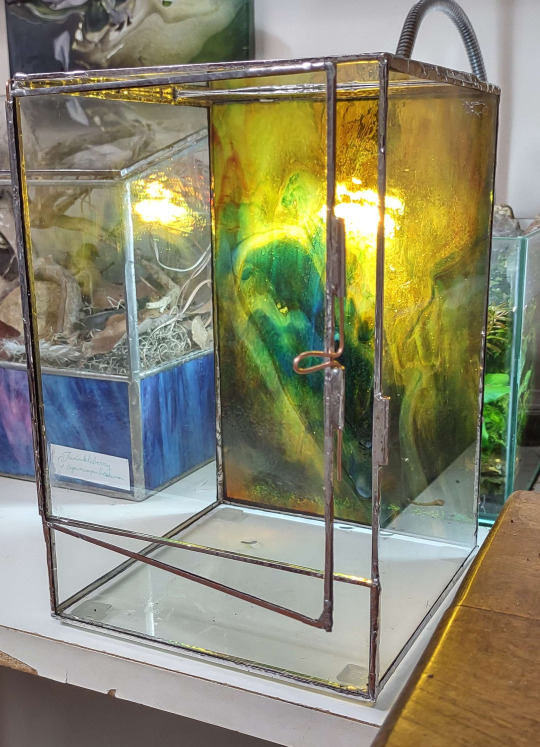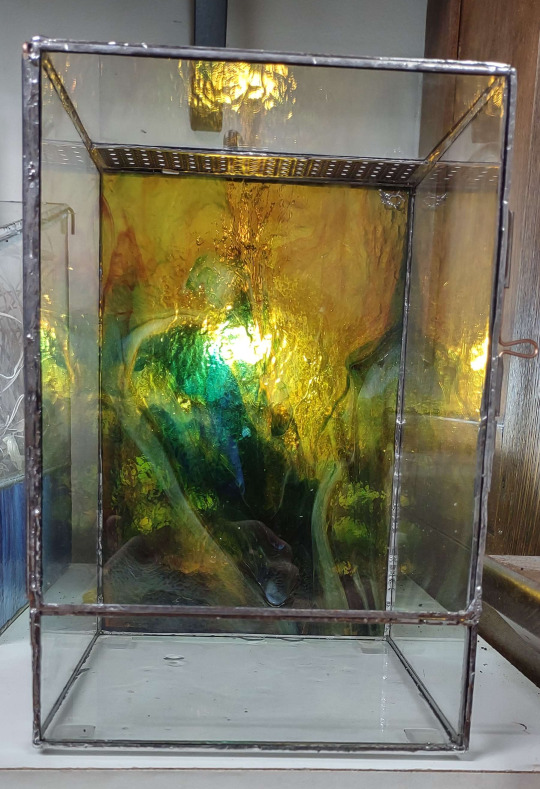Don't wanna be here? Send us removal request.
Text



This is Duck, a Cyriocosmus elegans. The last time I saw Duck was June 12, 2024, walking away into his new enclosure. This is the last picture I had of him, and the terrarium looked like this at the time.


I fed roaches; saw some webbing, and then.... nothing. For months, no roach I placed in there was eaten. No more webbing was made. The terrarium filled in. I checked throughout the day and night, dug things up as best I could, and... no Duck. I thought he'd died in there and the springtails ate him. I was super bummed, both for the project (I made these stained glass vivariums and biotopes for this spider in particular!) and for the spider. He was my second tarantula, and the first I'd raised from a tiny sling! So I got a new Duck a few months a go, a little sling that's doing well, with the intention of putting him in here when he was big enough... Last week, Goose, my Cyriocosmus sp tambopata, was put in his own glass enclosure with some fear and trepidation until I found his den a few days later (pics soon!). And then today, after dinner, I turned and saw him. The first Duck, in the terrarium, alive and starved, but unbelievably alive.
I got the smallest roach I had on hand, killed it, and set it up by Duck where I'd hoped he would scavenge it... Instead he pounced on it! So hungry and with such a great appetite. He ended up dragging it behind the fern so I think that's where he's nesting now, but I am SO THRILLED to know he's still here. I don't know where he's been this whole time, if he's been wandering and we never crossed paths or he's just been burrowed for eight months. I've seen little roaches in the enclosure but it sure doesn't look like Duck ever hunted them. It is a mystery! And a very happy reunion.

The terrarium from a couple weeks ago, all filled in.
7 notes
·
View notes
Text

Twinkleberry, juvenile Chromatopelma cyaneopubescens.
#tarantula#spider#tarantulablr#spiderblr#chromatopelma cyaneopubescens#green bottle blue#tarantula: twinkleberry
1 note
·
View note
Text



Bark spiders (Caerostris spp.) by Chien C Lee on Flickr, originals at flic.kr/p/2kHkm3J & flic.kr/p/2qqA9zG & flic.kr/p/2kJQyGW. (Posting images directly here so I can add alt text.)
This week I was distraught - genuinely fkn mortified - to discover that my lovely other half, my beloved Kitty the cat-human, doesn't... I mean truly *does not*... Think that bark spiders are friggin adorable.
I weep, OMFGs.
Like. I know I should just be happy that they've come to a point where they evict spiders with a cup & card, instead of squishing them.
But bark spiders.
I mean.
Bark spiders are so cool! They look like bark, FFS.
Look at these bark spiders. Behold them! These fancy spood ladies. The twiggy lookin butts. Their smol faces. Glorious weirdos, how could you be mean to a tiny mush like that? The females only get to a couple of centimetres apparently, males are much smaller. They're soo smol, it's not like they're gonna hurt you Kitty? I mean... Look how anxious they look hugging their twigs?? (Gestures at the world) I feel you, little buddies.
I know they're not the most elegant spoods in webs or wombling around, but they are good cryptic critters, pls be nice to them.
77 notes
·
View notes
Text
me trying to not obsess over tarantula species I don't need and have no immediate funds for

34 notes
·
View notes
Text
Cyriocosmus elegans taking prey.
6 notes
·
View notes
Text
Information: https://pubs.sciepub.com/aees/8/6/29/index.html



middle pic by Gururaj Gouda



Missing India desperately so what if I got a tarantula that was native to as close to my home as I could get (no tarantulas where I lived exactly), and then did my best to replicate the native habitat and hillside-burrowing habits in an arboreal set up (12"x12"x18") and--
(Photos by jithesh and bhuvanrajk on iNaturalist, respectively)
1 note
·
View note
Text



Missing India desperately so what if I got a tarantula that was native to as close to my home as I could get (no tarantulas where I lived exactly), and then did my best to replicate the native habitat and hillside-burrowing habits in an arboreal set up (12"x12"x18") and--
(Photos by jithesh and bhuvanrajk on iNaturalist, respectively)
1 note
·
View note
Text
Current Collection: Chromatopelma cyaneopubescens, 0.1.0, Twinkleberry Citharacanthus cyaneus, 0.0.1, Knees Cyriocosmus elegans, 0.0.1, Baby Duck Cyriocosmus sp tambopata, 0.0.1, Goose Hapalopus formosus, 0.1.0, Trundle Thrixopelma cyaneolum, 0.0.1, Banjo Want List: Caribena versicolor Hapalopus sp columbia 'klein' (not sure if it got put under formosus) Cyriocosmus leetzi, perezmilesi, bicolor Hapalopus guerreroi Monocentropus balfouri Harpactira pulchripes Chilobrachys natanicharum Thrigmopoeus truculentus
Goals: I'd love to breed the C. sp tambopata. My sling is from Michael Wells, who bred the first US captive bred specimens -- mine is from that very first sac. He's out of the hobby now but I'd like to continue the line and get more of these in the hobby.
The C. natanicharum makes me want to set up a mangrove biotope and that is really the only draw but it's tickling that itch right now. This and the H. pulchripes would wait until the kids are older. Don't want to make any potentially costly mistakes with them around. (But what if I got a T. truculentus, a little slice of home even though there are no tarantulas in my end of India but this species is the closest... and they're not too expensive and I could make a really cool set up in an arboreal enclosure to mimic the hillsides they burrow in and--) Mentally, I'm saving one "slot" for a C. versicolor. I'm about out of room but will always try to make space for the other Hapalopus (klein is high on my list) and a couple more Cyriocosmus, but the versi is right at the top of what I'd like to get.
Next big step is figuring out a better shelving, lighting, and heating system for my spiders. A lot of them got moved to my art shelves, darker and more out of the way, and I've really seen Trundle and Goose out and about a ton. I'd like to replicate that but the shelves are very low and I'd need some very slim lights to keep them there. But heating is the big goal. Before that, I'll be building Trundle a new terrarium, moving to glass with a sloped front, as the acrylic case I've got her in is all scratched up. Goose will probably go into the stained glass terrarium soon, but really feeling I need to up my temperatures before then. Everyone else is itty bitty and, in Twinkleberry's case, good where they're at for a long while.
0 notes
Text

So, the picture is shit but this is Trundle, my Hapalopus formosus, giving me some real good evidence that she would benefit from a heat source. That black beside her? That's the stove that we were just cooking lunch on. The air temp near her viv is warm but far from hot, and she has herself pressed against the acrylic nearest the stove. In the couple days she's emerged from her burrow, this is the second time I've caught her doing just this; it is not a behavior she displays when the stove is off. She's got plenty of room to go to the cooler side of her viv, too.
2 notes
·
View notes
Text


Small update on both terrariums after some plant mail arrived yesterday.
6 notes
·
View notes
Text


Planted!
Psygmorchis pusila, Peperomia serpens, P. rotundifolia, P. emarginella, Selaginella diffusa, S. kraussiana, and a NOID Gesneriad from the general region. Next step is to be very patient and wait to see that everything is rooting and surviving. I'll be adding my springtails shortly (Neanura growae, non-native but cute) and later will put my Trinidad dwarf tarantula (Cyriocosmus elegans) in it.
10 notes
·
View notes
Text

Twinkleberry, Chromatopelma cyaneopubescens.
2 notes
·
View notes
Text



The stained glass terrarium I've been working on for a long while is finally done!!! 6"x6"x9", with a perforated metal screen. This will house my Cyriocosumus elegans in a Trinidad biotope.
80 notes
·
View notes
Text





I recently moved Twinkleberry into his new enclosure. I think it may be on the small side once he matures but this is plenty of room for now. I made the stained glass Wardian case myself, and everything in there is locally foraged. It's hard to tell, but it has a canted lid which makes it great for viewing. Ventilation could probably be better but it's hardly a moisture trap; the lid is held opened a ~1/4" by silicone bumpers which is far better than holes drilled in acrylic panels. I'm tempted to add Armadillidium klugii 'Montenegro' or 'Dubrovnik', but still researching care for this isopod species. I have no concern for the isopods bothering the tarantula, and Twinkleberry is very willing to take roaches so I don't think he'll bother the pods, either. Just a matter of being able to keep the humidity up which also shouldn't be an issue. I've got three inches of substrate that's easy enough to keep damp in spots without raising the overall humidity.
3 notes
·
View notes
Text
Hi! I keep tarantulas, freshwater aquariums, and some miscellaneous inverts in bioactive, naturalistic set ups. This blog is meant to showcase my spiders but may also look into my other critters. Tarantulas:
Twinkleberry: Chromatopelma cyanopubescens, Green Bottle Blue, juvenile
Trundle: Hapalopus formosus 'large', Pumpkin patch, juvenile
Duck: Cyriocosmus elegans, Trinidad dwarf, juvenile
Goose: Cyriocosmus sp. tambopata, sling
Knees: Citharacanthus cyaneus, Cuban orange-violet, sling
Toes: Citharacanthus cyaneus, Cuban orange-violet, sling
Pudge (deceased): Hapalopus formosus 'large', male; purchased as a mature male, Pudge lived for six months and started it all for me.
Inverts:
Two American millipedes, Armadillidium vulgare (native) and Armadillidium maculatum 'zebra' isopods, and whatever beetles, grubs, and caterpillars may cross paths.
Aquariums:
1gal: planted low tech, no heater, no filter, Walstad method, stocked with a few cherry shrimp and microfauna
5gal: homemade planted low tech, heated and with sponge filter, Father Fish method, stocked with ember tetras and cherry shrimp
30gal: blackwater low tech, stocked with a juvenile Eastern musk turtle (Oakleaf), cherry shrimp, clams, and various tropical fish that came with the original set up

1 note
·
View note